Ban Ki-moon: Education must be our first priority

"Education is the cornerstone of human progress -- the key to the future we want – and crucial for African development."
I grew up in South Korea amid the devastation of war. Despite growing up with fear and impoverishment, education gave me hope and confidence in the future. Education set me on a path towards fulfilling my dreams. I want to give that same hope to those who know educational deprivation today -- the 61 million children who are out of school, the hundreds of million who lack opportunities for quality learning, and the 775 million adults who cannot read and write.
Everywhere I travel, places recovering from war or natural disaster – when I ask what the United Nations can do to help, the first thing people ask for is education. Even in the most dire of circumstances, the answer is always the same: people want their children back in school. They understand that this is the basic building block of every society. Education is the single best investment nations can make to build prosperous, healthy and equitable societies.
Access+
Yet we are facing a crisis in education. We have a learning deficit – of those in and out of school – that poses huge challenges for sustainable development. What was once a steady decline of out of school children has stalled, and in some regions, started to increase. This is of great concern. If the total number of children and youth out of primary and lower secondary school were concentrated in one location, the population alone, 131 million, would make the tenth largest country on earth.
Sub-Saharan Africa accounts for half of the world’s total out of school population. What is more worrying is that, according to recent data released by UNESCO, there are more children out of school in sub-SaharanAfricatoday than three years ago. The majority of them are unlikely to ever enter school. It is also true thatAfricahas made significant progress since 2000. Enrolment has increased and the gender parity gap has narrowed.
The growing number of success stories across Africa indicates that progress is attainable. I have travelled to Africa extensively and have witnessed first hand the wealth of talent and ingenuity of its people. I have seen the dividends of investing in education. The challenge is to extend these advances and ensure they reach all Africans, especially the continent’s poorest and most vulnerable people.
We cannot afford the cost of leaving the millions of children, youth and adults, in the margins of society around the world. We cannot afford to lock them out of the opportunities made possible by education.
This is why I am launching a new initiative this September, Education First, to put education at the heart of the social, political and development agenda. Education First will focus on three areas:
First, putting every child in school. We must ensure that every child -- whatever their gender, background, ethnicity, mother tongue or place they live – has equal access to education. We must remove barriers to attending school and completing basic education.
Second, improving the quality of learning. Getting into school is not enough; we have to make sure that young people learn basic reading, writing and numeracy skills. The quality of learning remains desperately low in many parts of the world. We need more qualified teachers that are rewarded and recognised for the critical role they play. We still do not pay teachers what they are worth to society.
Third, fostering global citizenship. Education provides far more than an entry point for the job market; education brings shared values to life. Education can help us live together by promoting mutual understanding, tolerance and respect. It is also a pathway towards living in harmony with our planet and with those we share it with.
Education First aims to rally a broad spectrum of actors to spur a global movement to achieve quality, relevant and transformative education for all people throughout the world. This includes mobilising additional financing, tackling bottleneck issues, and raising the profile of education. The media is an important partner in such an endeavour.
I am heartened that this issue of This is Africa is focusing on education. I look forward to the new research on education and learning in Africa that will be produced by the Center for Universal Education at the Brookings Institution. And I thank the Financial Times Ltd and Pearson for their commitment to this effort.
Education is the cornerstone of human progress -- the key to the future we want – and crucial for African development. I am determined to make Education First a great success in making sure that all children, youth and adults have the hope and opportunity that was once given to a young boy growing up in war-tornKorea.
Access+
|
| Access+: A focus on education in Africa This Is Africa takes an in-depth look at the state of education in Africa Visit our Access+ page for: |
|
This is Africa is now on Twitter!
Most Viewed Content
-
15 recommendations
-
2 recommendations
-
1 recommendations
-
1 recommendations
-
3 recommendations
-
1 comment
-
1 comment
-
1 comment





